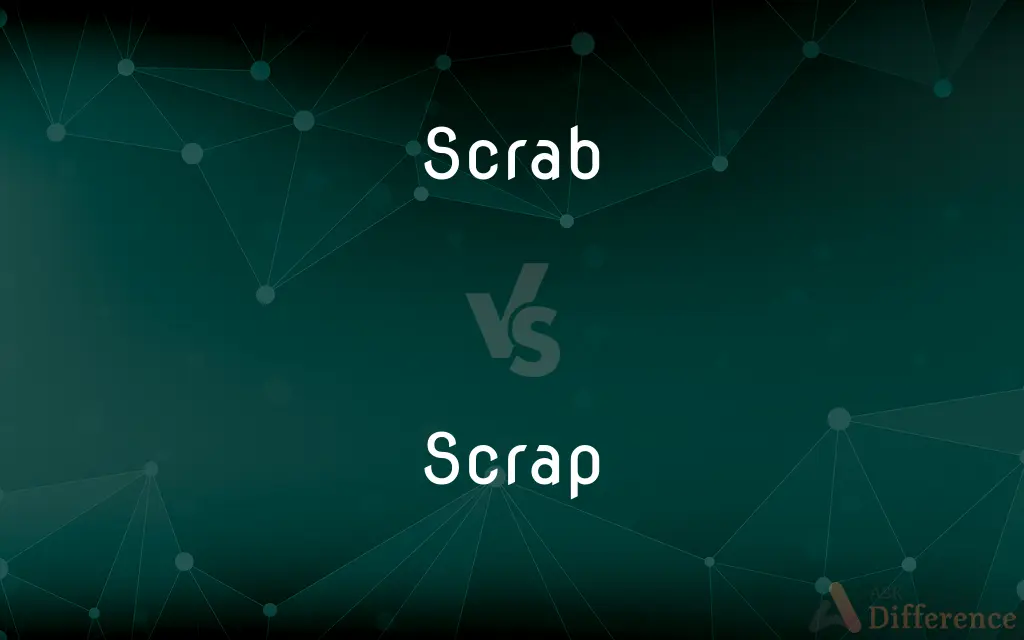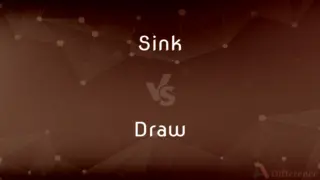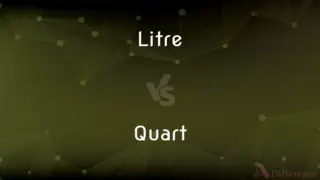Scrab vs. Scrap — What's the Difference?
By Tayyaba Rehman & Urooj Arif — Updated on March 31, 2024
Scrab is a lesser-known term often used in dialect or archaic contexts to mean scratch or claw, while Scrap refers to a small piece or amount of something, especially metal.

Difference Between Scrab and Scrap
Table of Contents
ADVERTISEMENT
Key Differences
Scrab is an action-oriented term, primarily associated with the act of scratching, clawing, or scraping, especially with the nails or claws. It evokes images of physical or desperate effort to gain hold or make an impression on a surface. Whereas, Scrap refers to the material outcome or byproduct, often pieces or fragments left over from something larger or the remnants of waste material, especially metals or fabrics. It represents a tangible object rather than an action.
Scrab, due to its archaic or dialectical usage, is less commonly found in contemporary English, suggesting a niche or specialized context when it is used. It might be encountered in literature, historical texts, or regional dialects, giving a flavor of antiquity or locality. On the other hand, Scrap is widely recognized and used across various contexts, from industrial (like metal scraps) to everyday language (like a scrap of paper), indicating its versatility and familiarity.
In the realm of usage, Scrab is more likely to describe an action that is aggressive or desperate, such as animals scrabbing at their prey or a person scrabbing at a surface to find a hold. This usage underscores a dynamic or kinetic quality. Conversely, Scrap is static, referring to the remnants or leftovers that have no further immediate purpose but might be recycled or disposed of, highlighting its passive and residual nature.
The frequency and context of usage also differ significantly; Scrab is relatively rare and might be considered poetic or creative, used to evoke a specific image or action. Scrap, however, is a common term, encountered in both everyday and professional language, illustrating its broad applicability and understanding.
While Scrab's application is primarily descriptive of specific actions or behaviors, Scrap finds its utility in describing the state, condition, or form of material objects, showing a clear division in their conceptual domains.
ADVERTISEMENT
Comparison Chart
Definition
Action of scratching or clawing
Small piece or fragment, especially of metal
Context
Archaic, dialectical, literature
Industrial, everyday, recycling
Nature
Action-oriented, dynamic
Material, static
Commonality
Rare, specific contexts
Widely recognized, versatile
Usage Example
Scrabbing at the earth
A scrap of paper
Compare with Definitions
Scrab
To scratch or grope clumsily or frantically.
The cat scrabbed at the door to be let out.
Scrap
A small piece or fragment of something, especially discarded waste.
He picked up a scrap of metal from the ground.
Scrab
To make a mark or scratch with a sharp or claw-like instrument.
She scrabbed her initials into the tree's bark.
Scrap
A tiny amount or piece of something.
She jotted her number on a scrap of paper.
Scrab
To move or make one's way with difficulty.
They scrabbed up the steep incline.
Scrap
Material intended for recycling.
They collected scraps to be turned into new products.
Scrab
To struggle or scrape to find or achieve something with difficulty.
He scrabbed a living in the harsh landscape.
Scrap
Fragmentary or residual pieces of information or resources.
They had to make do with the scraps of information available.
Scrab
To claw at something aggressively.
The eagle scrabbed at its prey.
Scrap
Leftover material from manufacturing processes.
The factory sells off its metal scraps.
Scrab
Scratch or scrape (something)
The police desperately scrab for leads
With the other hand I scrabbed his face
Scrap
Scrap consists of recyclable materials left over from product manufacturing and consumption, such as parts of vehicles, building supplies, and surplus materials. Unlike waste, scrap has monetary value, especially recovered metals, and non-metallic materials are also recovered for recycling.
Scrab
An injury or mark caused by scratching
She had scrabs on her back
Scrap
A small piece or amount of something, especially one that is left over after the greater part has been used
Scraps of information
I scribbled her address on a scrap of paper
Scrab
(transitive) To scrape or scratch.
Scrap
Discarded metal for reprocessing
The steamer was eventually sold for scrap
Scrab
A crabapple.
Scrap
A fight or quarrel, especially a minor or spontaneous one
He had several minor scraps with the army authorities
They were involved in a goalmouth scrap and a player was sent off
Scrap
Discard or remove from service (a redundant, old, or inoperative vehicle, vessel, or machine), especially so as to convert it to scrap metal
A bold decision was taken to scrap existing plant
Scrap
Engage in a minor fight or quarrel
The older boys started scrapping with me
Scrap
A small piece or bit; a fragment.
Scrap
Scraps Leftover bits of food.
Scrap
Discarded waste material, especially metal suitable for reprocessing.
Scrap
Scraps Crisp pieces of rendered animal fat; cracklings.
Scrap
A fight or scuffle.
Scrap
To break down into parts for disposal or salvage
Scrap an old stove.
Scrap
To discard or abandon as useless; cancel
Scrap a plan.
Scrap
To fight, usually with the fists.
Scrap
A (small) piece; a fragment; a detached, incomplete portion.
I found a scrap of cloth to patch the hole.
Scrap
The smallest amount.
I don't care a scrap.
Scrap
Leftover food.
Give the scraps to the animals: any meat to the dogs, and the rest to the hogs.
Scrap
The crisp substance that remains after drying out animal fat.
Pork scraps
Scrap
(uncountable) Discarded objects (especially metal) that may be dismantled to recover their constituent materials, junk.scrap [4]
That car isn't good for anything but scrap.
Scrap
A piece of deep-fried batter left over from frying fish, sometimes sold with chips.
Scrap
(uncountable) Loose-leaf tobacco of a low grade, such as sweepings left over from handling higher grades.
Scrap
A Hispanic criminal, especially a Mexican or one affiliated with the Sureno gang.
Scrap
(obsolete) A snare for catching birds.
Scrap
A fight, tussle, skirmish.
We got in a little scrap over who should pay the bill.
Scrap
(transitive) To discard.
Scrap
To stop working on indefinitely.
Scrap
(intransitive) To scrapbook; to create scrapbooks.
Scrap
(transitive) To dispose of at a scrapyard.
Scrap
(transitive) To make into scrap.
Scrap
To fight
Scrap
Something scraped off; hence, a small piece; a bit; a fragment; a detached, incomplete portion.
I have no materials - not a scrap.
Scrap
Specifically, a fragment of something written or printed; a brief excerpt; an unconnected extract.
Scrap
The crisp substance that remains after drying out animal fat; as, pork scraps.
Scrap
Same as Scrap iron, below.
Scrap
A small fragment of something broken off from the whole;
A bit of rock caught him in the eye
Scrap
Worthless material that is to be disposed of
Scrap
A small piece of something that is left over after the rest has been used;
She jotted it on a scrap of paper
There was not a scrap left
Scrap
The act of fighting; any contest or struggle;
A fight broke out at the hockey game
There was fighting in the streets
The unhappy couple got into a terrible scrap
Scrap
Dispose of (something useless or old);
Trash these old chairs
Junk an old car
Scrap your old computer
Scrap
Have a disagreement over something;
We quarreled over the question as to who discovered America
These tewo fellows are always scrapping over something
Scrap
Make into scrap or refuse;
Scrap the old airplane and sell the parts
Scrap
Disposed of as useless;
Waste paper
Common Curiosities
What is scrab used for?
Scrab is primarily used to describe a scratching or clawing action.
Can scrap be recycled?
Yes, scrap, especially metals, is often collected for recycling.
Is scrab a common term in modern English?
No, scrab is less common and more often found in specific or archaic contexts.
How is scrap typically generated?
Scrap is generated as a byproduct of manufacturing processes or when something is discarded.
Can scrab be used in a positive context?
While it describes a forceful action, it's neutral and can be positive depending on the context, like showing determination.
Are there industries based around scrap?
Yes, the recycling and scrap metal industries are significant examples.
Can scrap be hazardous?
Some scrap, especially electronic or chemical, can be hazardous without proper handling.
Is scrab ever used in a figurative sense?
It can be, to describe a struggle or effort in a metaphorical sense.
How does the environmental impact of scrap compare to other wastes?
Scrap's impact can be mitigated through recycling, making it less harmful than non-recyclable waste.
What kinds of materials can be considered scrap?
Metals, paper, fabric, and plastic are common types of scrap.
Is there a difference in the value between scrab and scrap?
Scrap can have economic value, especially as recyclable material, whereas scrab's value is more descriptive or contextual.
Can the term scrap have a non-material meaning?
Yes, it can refer to small, often insignificant amounts of non-material things, like information.
Does scrab imply a negative action?
Not necessarily; it depends on the context, such as survival instincts or determination.
Can both terms be used interchangeably in any context?
No, their meanings and applications are distinct and not interchangeable.
How do cultural perceptions of scrab and scrap differ?
Scrap is often viewed in terms of waste or recycling, while scrab's perception is more tied to its rare or specific usage.
Share Your Discovery

Previous Comparison
Sink vs. Draw
Next Comparison
Litre vs. QuartAuthor Spotlight
Written by
Tayyaba RehmanTayyaba Rehman is a distinguished writer, currently serving as a primary contributor to askdifference.com. As a researcher in semantics and etymology, Tayyaba's passion for the complexity of languages and their distinctions has found a perfect home on the platform. Tayyaba delves into the intricacies of language, distinguishing between commonly confused words and phrases, thereby providing clarity for readers worldwide.
Co-written by
Urooj ArifUrooj is a skilled content writer at Ask Difference, known for her exceptional ability to simplify complex topics into engaging and informative content. With a passion for research and a flair for clear, concise writing, she consistently delivers articles that resonate with our diverse audience.
















































